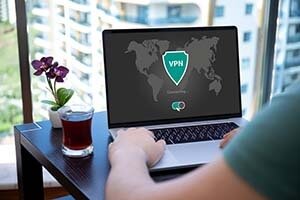Navigating Android VPNs and the Google VPN Ban Policy
We live in a dynamic, digital era, and the importance of online security is crucial. Practically, everyone uses smartphones — Android devices in particular, and the need for Virtual Private Networks (VPNs) has become more prevalent. So the big question is — Is it safe to use VPNs on your smartphone?
An Introduction to Android VPNs
VPNs essentially send your data in an encrypted format and allow devices that aren’t physically on a network to securely access the network. VPNs are a great tool as they protect your data through encryption and mask your IP address, leaving your location and browser history hidden.
You can get paid VPNs and there are also free versions available; however, you really need to be careful with those free ones. As they say, “Nothing in life is free.” The free versions typically come with increased risks that could potentially do more harm than good.
Rising popularity of VPNs among Android gamblers
More and more people are using VPNs, and there’s an even bigger surge among Android users, particularly among online gamblers. This is because, as an online gamer, you can bypass geo-restrictions and access betting platforms that aren’t available in your country or region. The upside is that VPNs offer a convenient solution to these restrictions, the downside is the fact that there are some risks associated with VPN use.
What are the Risks Involved When Using a VPN?
Despite the benefits, using a VPN on Android devices does, unfortunately, come with underlying risks. These risks range from potential data breaches to exposure to malware. If you’re a VPN user, you need to be aware of all the risks that may be associated. Here are some of the issues you may experience:
Devices have to be protected individually
If you use a VPN on your laptop, that will be the only device that is protected. You have to install the same software on your phone, to protect each device, as it doesn’t happen automatically across your devices. You need to use a VPN router or install an app on all devices that connect to the internet for full protection.
Note: When you connect your VPN to a different device, it will connect, regardless of whether that device is corrupted or not. Therefore, your data will transfer back and forth from the vulnerable device to your other device, creating the opportunity for a data leak.
Speed issues may arise
We can all agree that slow internet is incredibly frustrating, and VPNs can definitely affect your internet speed. Why? In short, the encryption process adds extra steps, it uses up more bandwidth and inevitably, this will slow down the speed of your connection.
Be careful of viruses and malware
Some VPNs (not all) can protect your computer from viruses or malware. But remember, a VPN’s primary purpose is to encrypt your connection and provide online anonymity. It’s not specifically designed to protect your device against harmful viruses. Hiding your IP address is not equivalent to comprehensive protection against malicious software. There’s no protection from downloading suspicious files and accessing phishing websites.
How PROXYLIB Malware Threatens Your Online Safety
The HUMAN’s Satori Threat Intelligence team recently discovered several VPN apps available on the Google Play Store that can transform a user’s device into a proxy node, without the user even knowing.
In May 2023, the team found malicious behaviour in a single free VPN application, “Oko VPN.” This app was readily available on Google Play Store but has thankfully, been removed by Google.
This suspicious operation is now commonly referred to as “PROXYLIB” (The name comes from the Golang library responsible for the distribution of these apps). The Satori researchers dug deeper into the matter and found 28 applications affiliated with PROXYLIB and they have all been removed.
This recent discovery sent Google into crackdown mode, to put an end to malicious VPN apps and has raised several concerns about the safety and reliability of using VPNs on Android devices.
How this malware can harm you
PROXYLIB poses a significant threat to a user’s privacy and security, as it can intercept and manipulate data transmitted over the internet. This threat ranges from stealing login credentials to injecting malicious code into legitimate websites. The dangers of PROXYLIB can be severe, as the operation created a large residential proxy network for criminal syndicates and fraudsters to purchase.
Google’s War on Suspicious VPN Apps to Ensure User Privacy
Since PROXYLIB was found to be available for download directly from the Google Play Store, this highlighted a need for more stringent app vetting processes and users need to be more vigilant when installing applications on their Android devices.
How has Google taken action?
There’s a happy ending to this story, or at least some relief for users. In response to the rapid increase in malicious VPN apps, Google has implemented stricter policies and measures to combat their distribution on the Play Store. Google has enhanced its app review processes and has ramped up the removal of non-compliant VPN applications through Google Play Protect
With Google Play Protect, Android users are automatically protected from such attacks. This new protection measure can warn users of malicious apps and block apps that exhibit suspicious behaviour, even when those apps come from outside sources. Numerous efforts are currently underway to counteract the impact and spread of PROXYLIB.
Say goodbye to Google one’s VPN service
The Google One VPN service will be discontinued starting from 10 June 2024. This may be due to several reasons, which may involve the company investing in other areas such as cloud storage, for example, and we can think of two others.
For one, the VPN market is highly competitive, with so many providers offering a wide range of services and features. Not to insult Google, but, as the biggest data collection company in the world, offering a service to help users protect their data from data collectors is quite… ironic. Scepticism may have been high among users and limited the sign-ups.
Last, but definitely least, is the sheer fact that operating a VPN service involves rigorous maintenance, updates, data protection protocols, and not to mention, all the infrastructure costs. It’s possible that Google may have assessed the technical challenges and costs associated with maintaining a VPN service and determined that it was not sustainable in the long term.
So, VPN by Google One has been discontinued. However, it will be available as a built-in capability on Pixel 7 and up devices, and you can also access it via Google Fi.
Secure Your Online Experience: Here’s How to Find A Reliable VPN
Now you’re probably thinking, “how can I find a reliable VPN?” To mitigate the risks associated with VPN usage, try to stay informed about your VPN provider’s security features and update your software regularly to protect yourself against emerging threats. Adopt best practices when you’re using VPNs — choose reputable providers, configure settings for your optimal security, and be cautious when you’re accessing sensitive information online.
Once you’ve selected a VPN, maximize its effectiveness by configuring it correctly and use it responsibly. Avoid engaging in activities that could compromise your privacy, such as accessing suspicious websites or sharing sensitive information while connected to public Wi-Fi networks.
Essential Steps to Take Before Buying an Android VPN
Safety first: Avoid using free VPNs
These are typically not as secure as they should be. Free VPN providers lack the much-needed resources to create and maintain efficient security protocols.
Maximize your options: Get the perfect provider for you
Look at the encryption protocols, server locations, logging policies, and user reviews. For example, VPN providers often claim they don’t keep logs of your online activity —this isn’t necessarily true. VPNs have to keep, at minimum, connection logs to provide the service. So check what you’re comfortable with, before joining a new VPN.
Know the origin of your VPN provider
Providers are bound by the laws of their home country. Some countries require VPN providers to store their collected data for national security reasons, and this data may have to be submitted to authorities. This will definitely conflict with anonymity and your privacy, so in short: know which country your VPN provider is from.
Too many VPN servers = Too many risks
Too much of a good thing really can be a bad thing. VPN providers essentially “rent” servers from all over the world, to provide their service. If a VPN provider offers a large volume of server options, it means they probably have less control of their whole server network.
Since they manage a vast number of servers, across various locations around the world — needless to say, this can be challenging, and data breaches are more likely to occur. So when making your choice, consider locations that you actually need, don’t just go for the option with the highest number of servers.
The Future of VPN Security and Reliability
While the landscape of Android VPNs may present challenges and risks, as a user, you need to exercise caution and select reputable providers. Whether you’re a seasoned VPN user or new to the world of virtual private networks, understanding what you’re signing up for is key to safeguarding your digital presence in an increasingly unstable global network. Stay informed, stay vigilant, and prioritize your online privacy and security with a reliable VPN solution.
What’s the Verdict: To VPN or not to VPN?
Let’s go back to our initial question: Is it safe to use VPNs on your mobile phone? Short answer (and we’ll be honest here) Not really. With thorough research, you can find a reliable and efficient provider, but there are no guarantees.
A VPN provider might say they have top-notch security and all of your data is secure, but as we’ve covered above, this isn’t 100% true. Data can be compromised, there’s a third party involved, it’s just not airtight.



